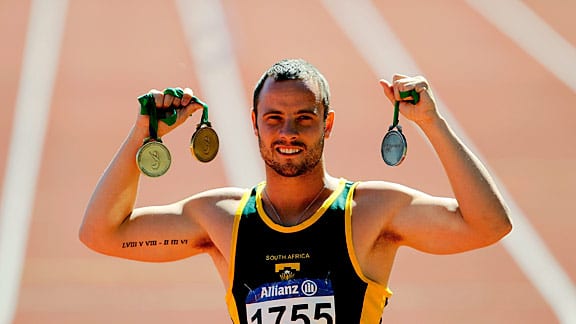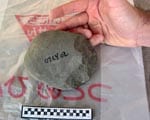Sports journalist Johnette Howard quotes SMU’s Peter Weyand, an expert in human locomotion, in an Aug. 5 article “The Olympics loom for Oscar Pistorius”
Howard examines the accomplishments of double-amputee sprinter Oscar Pistorius and the controversy that has dogged his racing career. Preparing now for the 2012 London Olympics, the 24-year-old South African once again is under the spotlight for his controversial carbon-fiber prosthetic legs that attach just below his knees.
Weyand is widely quoted in the press for his expertise on human speed. He led a team of scientists who are experts in biomechanics and physiology in conducting experiments on Oscar Pistorius and the mechanics of his racing ability. Pistorius has made headlines worldwide trying to qualify for races against runners with intact limbs, including the Olympics.
Weyand is an SMU associate professor of applied physiology and biomechanics in the Annette Caldwell Simmons School of Education & Human Development.
EXCERPT:
By Johnette Howard
ESPN
You hope the murmuring and arguing that has already restarted now that Oscar Pistorius has done the remarkable, the extraordinary, the heretofore unfathomable will not drag him down between now and the 2012 London Olympics. Because what Pistorius, a double-amputee sprinter, was able to do on a muggy night in Lignano, Italy, on July 19 is the sort of mind-blowing achievement that shouldn’t be unfairly derailed by this unsettled debate. He thought he had already navigated it once, but now it’s likely to trail the 24-year-old South African all the way to next year’s Olympic Summer Games. [ … ]Perhaps the most contentious assertion, Peter Weyand, an associate professor of applied physiology and biomechanics at Southern Methodist University, and Matthew Bundle, now an assistant professor at the University of Montana, have argued that, among other things, Pistorius enjoys as much as a 10 to 12 second advantage in a 400-meter race using his prosthetic legs, for reasons Weyand says have to do with the frequency of how quickly Pistorius is able reposition his lightweight legs as he strides; the force he exerts; the longer length of time each of his prosthetic feet remains on the ground; and reduced ground force requirements to attain the same sprinting speeds.
“You can collect more data, but the answers about Oscar Pistorius are in, in my opinion,” Weyand said in a phone interview Tuesday. “He is able to run faster than many of his competitors even though he does not hit the ground as hard.”
To which Hugh Herr of MIT, another member of the Pistorius research group, retorts, “It baffles me why Weyand and Bundle continue to say that.”
Herr, an associate professor and director of MIT’s biomechatronics research group, argues, “You really have to have rigorous, peer-reviewed, published, carefully examined scientific evidence. [Weyand-Bundle’s argument] is simply a calculation, nearly a back-of-the-envelope calculation. To label it as a scientific study is very misleading. ??? Their calculation was never published in a peer-reviewed paper. It was in the point/counterpoint article, which was not rigorously peer-reviewed.”
So the debate about Pistorius lives on. But how much does it still matter?
Other than perhaps inhibiting his training — as the IAAF controversy and CAS fight did back in 2008, when he admitted it dragged him down emotionally (“It’s been completely on this kid’s back to prove everything himself so he can run,” Mullins says) — the griping needn’t stop him.
“As far as we are concerned, the CAS decision is final and the case is closed, as long as he continues to compete on the same prosthetic legs the CAS ruled on,” insisted Jeffrey Kessler, the New York-based attorney who took on Pistorius’ case on a pro bono basis and represents the National Basketball Player’s Association and NFL Players Association in their labor negotiations. “I spoke to Oscar on the phone the other day and I’ve committed to him that when he runs in London, I will be there. To me, this is about the rights of the disabled. He is one of the most inspiring people I’ve ever met in my life.”
Weyand has been careful to stress that he admires Pistorius, too, and finds the man and his accomplishments “absolutely extraordinary.” But Weyand considers himself just a scientist doing his job, and added that nothing he has asserted, “should in any way diminish what Oscar has done.”
SMU is a nationally ranked private university in Dallas founded 100 years ago. Today, SMU enrolls nearly 11,000 students who benefit from the academic opportunities and international reach of seven degree-granting schools. For more information see www.smu.edu.
SMU has an uplink facility located on campus for live TV, radio, or online interviews. To speak with an SMU expert or book an SMU guest in the studio, call SMU News & Communications at 214-768-7650.
 Sports journalist Johnette Howard quotes SMU’s
Sports journalist Johnette Howard quotes SMU’s 






